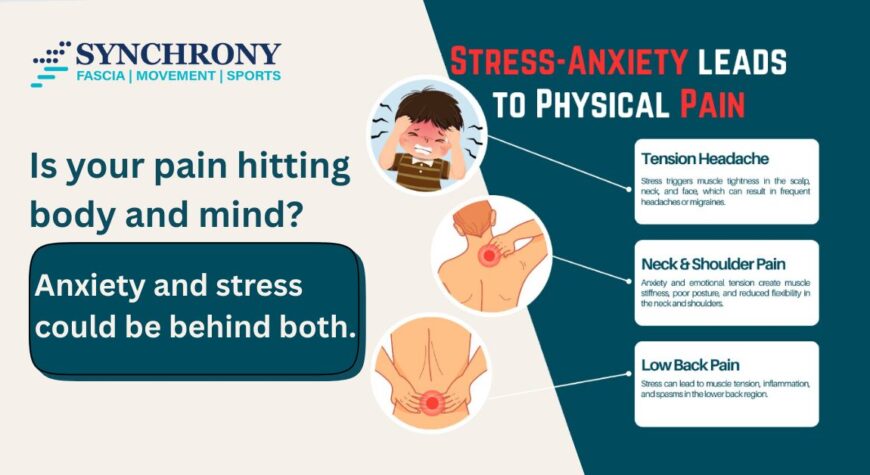What does Stress-Related Neck, Shoulder Pain and Headaches looks like?

You’re Not Imagining It—Your Feelings Really Can Hurt
Have you ever walked out of a difficult meeting with your shoulders up by your ears? Or noticed a pounding headache after a heated argument? Maybe your neck feels like a rock after a sleepless night worrying about finances or family issues?
Here’s something important to know: you’re not imagining things, and you’re definitely not alone. Your emotional state and physical comfort are deeply connected, and understanding this connection can be the first step toward feeling better.
What Happens When You Get Stressed
-
Your Body Goes Into Alert Mode
Think of stress like a fire alarm going off in your body. When you feel worried or scared, your brain sends out chemicals that make you ready to fight or run away. But since you can’t actually run away from your problems, your muscles just stay tight.
Here’s What Your Body Does:
Your Muscles Get Stuck: Your neck and shoulder muscles tighten up and forget how to relax. It’s like they’re constantly flexing, which makes them sore and stiff.
You Change How You Sit and Stand: When stressed, you might hunch your shoulders, clench your teeth, or hold your breath. This puts extra pressure on your neck.
Pain Moves Up to Your Head: The tight muscles in your neck send pain up to your head, giving you headaches that feel like someone put a tight hat on you.
Everything Else Gets Messed Up: Stress also makes it hard to sleep and can make pain last longer than it should.
Why Breathing Matters
- When you’re stressed, you breathe wrong. Instead of breathing deep into your belly, you take quick, shallow breaths with your chest. This makes your neck muscles work extra hard to help you breathe, which makes them even more sore.
- The right way to breathe: Use your belly, not your chest. Your main breathing muscle (called the diaphragm) sits under your lungs and should do most of the work.
Watch a sleeping dog or baby—their belly goes up and down, not their chest. That’s how you should breathe too.
What Happens During Panic Attacks
Sometimes stress gets really intense and your body goes crazy. Your heart beats super fast, you breathe really quickly, and all your neck muscles clamp down at once. This can make you dizzy and give you worse headaches, even though nothing is actually wrong.
Simple Ways to Feel Better
1. Learn to Breathe Right
Easy Breathing Exercise:
● Sit or lie down comfortably
● Put one hand on your chest, one on your belly
● Breathe in slowly through your nose—only your belly hand should move up
● Breathe out slowly through your mouth
● Do this for 2-3 minutes when you feel tense
2. Move Your Body Gently
Simple Stretches:
● Slowly roll your neck in circles
● Lift your shoulders up and down
● Try easy yoga moves
● Get up and walk around every 30 minutes
3. Relax Your Mind
Ways to Chill Out:
● Listen to music you like
● Try meditation apps (even 5 minutes helps)
● Picture your stress floating away like a balloon
● Talk to someone about what’s bothering you
4. Be Nice to Your Body
Help Your Sore Muscles:
● Gently rub your neck and shoulders
● Use a tennis ball against the wall on tight spots
● Take a warm shower or use a heating pad
● Get a massage if you can
5. Fix Your Everyday Habits
Better Posture Tips:
● Make sure your computer screen is at eye level
● Keep your head straight, not leaning forward
● Use good pillows when you sleep
● Take breaks from your phone and computer
Why You Need to Work on Both Your Mind and Body
Stress pain isn’t just physical or just mental—it’s both. Your thoughts affect your body, and your body affects your thoughts.
To really feel better, you need to:
● Fix the physical stuff (stretching, breathing, posture)
● Deal with the stress (relaxation, talking to people)
● Change bad habits (better sleep, moving more)
When to See a Doctor
Talk to a doctor if:
- Pain doesn’t go away after a week.
- Headaches get worse or happen more often
- Your arms feel numb or tingly
- Pain makes it hard to do normal things
- You’re having trouble with anxiety or panic attacks
The Bottom Line
Your feelings can definitely cause real pain in your neck and head. But the good news is you can do something about it. Start with simple breathing exercises and gentle stretches. Be patient with yourself—it takes time to feel better.
Remember: You’re not broken, and this isn’t permanent. With some simple techniques and a little practice, you can feel more comfortable and relaxed.
Start small, be consistent, and be kind to yourself along the way
